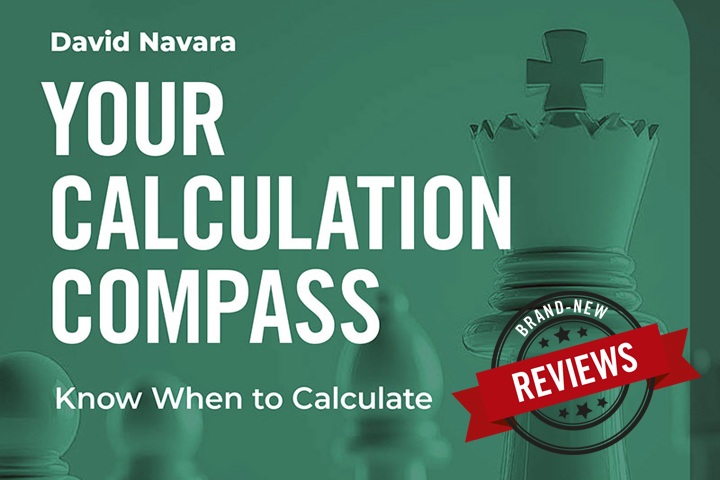How to do it – David Navara’s practical guide to calculation in tournament chess
How many points did you lose in your last tournaments because you ran out of time and couldn’t work out if your tactics would be effective at the crucial moment? My time management at the board isn’t disastrous, but it’s not great either. I probably lose at least one point in every league season this way. If you find yourself in a similar situation, David Navara’s course could help.
Time management is one of the topics covered by the Czech grandmaster (peak rating 2751) in Your Calculation Compass: Know When to Calculate. Navara demonstrates when it is pointless to spend time calculating variations and when it is better to trust your intuition and make a quick move. These rather abstract positions are often precisely where notorious time-pressed players get lost, as the possibilities are virtually endless. So, if you know someone like that, point them in the direction of David Navara’s course.
A practical guide – brief and concise
As the title suggests, this course acts as a compass. Navara discusses numerous concepts related to practical calculation in a clear and concise manner. Everything is illustrated with examples, many of which are drawn from his own tournament practice.
How is a real tournament game different from tactical exercises or studies? When is Kotov’s famous candidate moves model applicable? Should it be adapted somewhat in practice? How do calculation, positional evaluation and intuition work together?
Other concepts examined include invisible moves and the search for the unicorn. The list is quite long, and Navara covers each topic in short video clips.
Example – based on a game Navara-Bartel
Sometimes you have a position like this, where it’s clearly a matter of calculation and which “must” be won. But in all the obvious variations, there is somehow a problem.
1.Nf5 with the threat of mate on h8 looks good at first glance, but after 1…Rc1+ 2.Bf1 Rxf1+ 3.Kxf1 a1Q+ 4.Ke2 Qa2+ 5.Kf3 Ke8, f7 is protected and Black can free himself.
The endgame after 1.Nb3 a1Q+ 2.Nxa1 Rxa1+ 3.Bf1 Rcc1 is also not entirely clear.
I struggled with the diagram for a while and after a few minutes – somewhat impatiently – pressed “Play” to see the solution.
Can you find the winning move? It’s about hidden moves, and the correct move can be deduced from the variations that don’t work…
Navara-Nguyen Thai, Training match, Rapid 2018
A common mistake when calculating is not to consider all of your opponent’s tactical possibilities, especially at the beginning of the variation, and not to think broadly enough. In the diagram position, White is under pressure, but the move 21.Rxb6 seems to solve his problems, doesn’t it? The rook on e8 is hanging, and in some variations the knight on a5 is also hanging, for example 21…f6 22.Rb2 fxg5 23.Qxa5, and Black would have to settle for perpetual check, starting with 23…Bxh2+!
But after the simple 21…c6!! – Navara had not considered this tactical possibility by his opponent in the game – the rook on e8 is no longer under attack and White is in trouble. Black wins immediately, because 22.Rb2 Qxg5! protects the Na5 and 23.Bxg5 Re1# is mate.
A recommendation on how to work with this course
When playing the course with the ChessBase default settings, the solution is unfortunately always displayed immediately on the right-hand side of the notation field during Navara’s presentation. One way to avoid this and optimise the learning effect is to uncheck “Notation” in the View menu. This way, you will only see the video and the respective position, but not the notation. Then, if necessary, you can pause the video and search for the solution yourself first!
Course as a script
A useful bonus is that David Navara has written down the most important points of his presentation. Copied into a Word document, this script is about 3 to 4 pages long.
Summary
GM David Navara’s Calculation Compass may only be as long as a regular TV movie but for ambitious chess players, it is just as exciting! In an hour and a half, the Czech GM presents his compass for correct calculation (or non-calculation!) in a concise and compact manner. The notes provided by Navara can easily be transferred to a Word document so that you can refresh your memory of the concepts before important tournaments or games, if necessary.
In this insightful video course, Grandmaster David Navara shares practical advice on when to calculate deeply in a position — and just as importantly, when not to.
Free sample video: Introduction
Free sample video: Invisible moves
About the author
 David Navara (*1985 in Prague) is the strongest Czech chess player and has been part of the extended world elite for many years. A chess prodigy, he was coached early on by renowned trainers such as Luděk Pachman and won multiple national and international youth titles. He became an International Master at 14 and was awarded the Grandmaster title in 2002. Navara is a multiple-time Czech Champion and has played for the national team at every Chess Olympiad since 2002, usually on board one. His international highlights include reaching the quarterfinals of the 2011 World Cup and winning the European Blitz Championship in 2022. In addition to his chess career, he earned a master’s degree in logic from Charles University in Prague and has been a full-time chess professional since 2010. Navara is known for his sportsmanship and deep, strategic style of play.
David Navara (*1985 in Prague) is the strongest Czech chess player and has been part of the extended world elite for many years. A chess prodigy, he was coached early on by renowned trainers such as Luděk Pachman and won multiple national and international youth titles. He became an International Master at 14 and was awarded the Grandmaster title in 2002. Navara is a multiple-time Czech Champion and has played for the national team at every Chess Olympiad since 2002, usually on board one. His international highlights include reaching the quarterfinals of the 2011 World Cup and winning the European Blitz Championship in 2022. In addition to his chess career, he earned a master’s degree in logic from Charles University in Prague and has been a full-time chess professional since 2010. Navara is known for his sportsmanship and deep, strategic style of play.
